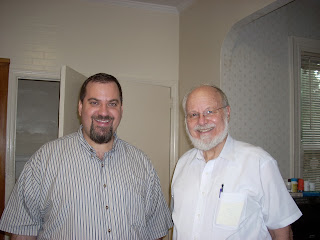Evolution of Judaism and the Seder
Jerusalem is under siege. The revolt against Rome is failing. The Beit Hamikdash, the heart and soul of Judaism, is about to be destroyed. The true worship of Hashem will be over, forever.
The year is 69 CE, and the end of Jewish nationhood and of the Jewish faith seems nigh.
---------------------------------
Rabbi Yochanan ben Zakai was a visionary. He knew that Judaism lay in intellectual achievement, in creating a legal and ritual system that didn't depend on grandiose temples or tributes to a priestly caste. He knew that God had to become a more abstract idea, not a unseen yet physical being who resided in a palace and who was fed by the smoke of animal sacrifices.
If Rav Yochanan ben Zakai and his successors had not realized these things, Jews and Judaism would likely have been just another of many dead Ancient Near East civilizations, with their temples, sectarian gods, and sacrificial cults.
 Instead, Judaism changed and took on a new life. The ancient narratives continued to evolve into a canonized whole, something to be studied, the word of Hashem, where minute variations in the text were intricately parsed to support and formulate a growing system of laws that became our halacha. This new Judaism replaced sacrifice with rituals that revolved around the family and community, not around an overarching national authority. The three-times-a-year gathering at the Beit Hamikdash became daily prayer and gathering at the local Mikdash Me'at, the Beit Haknesset. The study of Torah became the highest ideal of this old, yet new religion. New oral traditions were created, no longer etiological tales to explain our origins, but intricate legal discussions, legends, and even jokes, that were eventually canonized themselves, into the basic texts of our old/new religion, the Mishnah and Talmud.
Instead, Judaism changed and took on a new life. The ancient narratives continued to evolve into a canonized whole, something to be studied, the word of Hashem, where minute variations in the text were intricately parsed to support and formulate a growing system of laws that became our halacha. This new Judaism replaced sacrifice with rituals that revolved around the family and community, not around an overarching national authority. The three-times-a-year gathering at the Beit Hamikdash became daily prayer and gathering at the local Mikdash Me'at, the Beit Haknesset. The study of Torah became the highest ideal of this old, yet new religion. New oral traditions were created, no longer etiological tales to explain our origins, but intricate legal discussions, legends, and even jokes, that were eventually canonized themselves, into the basic texts of our old/new religion, the Mishnah and Talmud.---------------------------------
All of this required a new way of thinking, a new approach. Old rituals had to be changed and reinterpreted into something that could be performed in the home and in the shul.
Nothing symbolizes this more than the seder night.
Once upon a time, our ancestors sat in Jerusalem, in vast camps around the city on the first night of Pesach. The head of the household returned from the temple with the korban pesach, and they ate.
Now we recite maggid, and engage in lengthy exposition. We eat karpas, maror, korech, and the afikoman. We drink 4 cups of wine and pour one for Eliyahu, too. We lean as we eat and drink. We sit around a table with family and friends, and engage in elaborate rituals that are deeply intertwined with knowledge of our Torah and of our Halachah. This is something that our ancient ancestors would have barely recognized. This Pesach, we celebrate our freedom from Mitzrayim, without which Judaism could not have grown. But let us also celebrate the continuing growth and evolution of our faith, so aptly symbolized by the Seder night.
Maggid contains a passage that is one of the oldest in the Haggadah:
...עַל אַחַת, כַּמָּה וְכַמָּה, טוֹבָה כְפוּלָה וּמְכֻפֶּלֶת לַמָּקוֹם עָלֵינוּ
It then proceeds to list the various things that God has done for us.
Immediately preceding that passage, we sing the famous "Dayenu". This poem was written later. Its first full appearance is in the 9th century. Yet it is based on the above oldest part. Except that Dayenu leaves out the last words of עַל אַחַת, כַּמָּה וְכַמָּה, those words being לְכַפֵּר עַל כָּל עֲוֹנוֹתֵינוּ. During the few hundred years between two versions, Judaism evolved. In the last line of each, we thank God for building us the Beit HaMikdash. But by the time Dyenu was written, Judaism no longer needs a Beit HaMikdash to atone for our sins. We do that through prayer and mitzvot. And that's how it should be.
Chag Sameach

Comments
Post a Comment